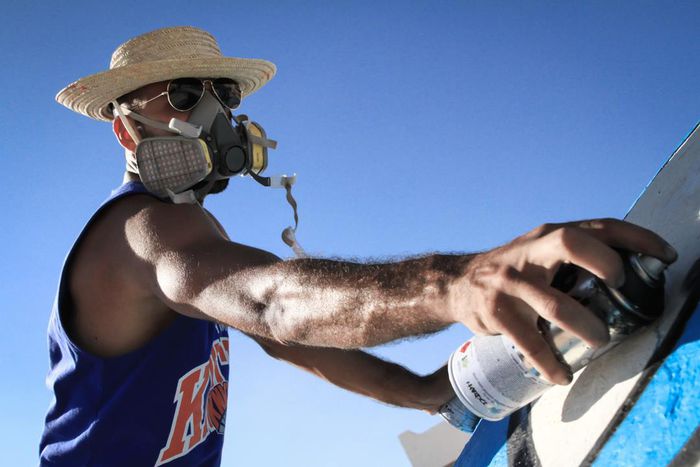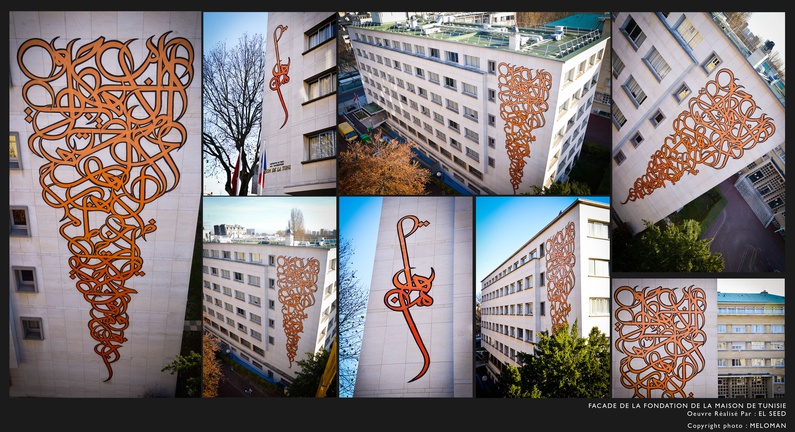
Paris : A place for tunisian culture?
Published on
Translation by:
Kait BolongaroTunisian culture is underrepresented in Paris, but some initiatives are trying to develop a post-revolutionary artistic scene. Who are these artists and what are their resources?
Where does Tunisian culture find a place in France? In any case, it’s not as visible in Paris as one could hope, considering the large number of Tunisian immigrants who live in the capital. After five days of searching, we found only one young talent representative of the Tunisian cultural scene. Akram Belaid likes to introduce himself as a 'cultural agitator'. A trained photographer and artist, he has been living in Paris for less than two years. Currently, he is the director for cultural activities at Tunisia House. Glancing through the cultural events proposed by the foundation, it is clear that it invests a great deal of effort in developing Tunisian culture in Paris. Most of their events are usually targeted towards Tunisians and Arabs living in France. This is a public thirsty for everything traditional, contrary to the more international crowd at the university residence where Tunisia House is situated, who are more interested in discovery.
Effort with Few resources
Tunisia House is one of the 39 houses of the International University Residence of Paris, located in the 14th arrondissement at Jourdan Boulevard. It was built in 1948 by the Public Education branch of the Tunisian government. It’s a French establishment regulated under French law, not only university accomodation.
I admit that at first I didn’t find Tunisia House, until I saw the Tunisian flag and the tags decorating the façades of the building. The work is by an artist named El Seed, who creates impressive calligraphy murals inspired from poetic verses. The foundation is managed by a small team of four people: the Director, Vice Director, Accountant and Cultural Coordinator. It hosts 200 Tunisian students and researchers. It is financially independent and doesn’t rely much on subsidies from the Tunisian government. It is trying to become less and less dependent, even if the house maintains ties with the Tunisian Embassy (the Ambassador is the Honorary President of the organisation).
 Under the direction of Akram Belaid, Tunisia House organises two to four cultural events per month and one or two flagship events per year. However, there isn’t much of an official presence of Tunisian culture in Paris. Akram confirms that org
Under the direction of Akram Belaid, Tunisia House organises two to four cultural events per month and one or two flagship events per year. However, there isn’t much of an official presence of Tunisian culture in Paris. Akram confirms that org
anising events or shows always begin as "individual initiatives".
Meriam Azizi, university professor, lutenist, singer and film director, agrees with Akram. She notes that the representation of Tunisian culture is marginalised and rarely considered. Meriam has been living in Paris since 2004 and is concerned about the difficulties faced by young Tunisian artists in Paris and their constant battle to prove themselves. However, Akram explains: “as soon as you have proven yourself, you are rewarded.” As soon as I ask Meriam and Akram why they prefer to be artists in Paris than in Tunisia, both agreed that in spite of some challenges, conditions in France are much better. In Tunisia, talent, potential and creativity exist, but there is a lack of resources and training.
militant Artists: keeping an eye on tunisia
Living in Paris doesn’t mean being cut off from political and social events in Tunisia. Tunisians living in Paris try to reverberate what is happening on the other side of the Mediterranean and participate in politics how they can, given the distance.
 My trip to Paris coincided with a demonstration, which I attended on Saturday May 17, 2014. It was organised by a group of young Tunisians at Place of the Republic, in support of Tunisian blogger and activist Azyz Amami who was arrested on Monday May 12th. Accused of taking drugs by the police, Azyz Amami and his friend, Sabri Ben Mlouka, were victims of a violent arrest that triggered a wave of indignation among the young protestors. Students and representatives from the Tunisian Popular Front, Tunisian rappers like Madou MC and Zied Ben Chikh, a tag artist known as ZED, were among the 30 people who participated in the protest. This gathering felt like a continuity of the causes that we advocate for in Tunisia, even on the other side of the Mediterranean, which warms my heart as a Tunisian activist.
My trip to Paris coincided with a demonstration, which I attended on Saturday May 17, 2014. It was organised by a group of young Tunisians at Place of the Republic, in support of Tunisian blogger and activist Azyz Amami who was arrested on Monday May 12th. Accused of taking drugs by the police, Azyz Amami and his friend, Sabri Ben Mlouka, were victims of a violent arrest that triggered a wave of indignation among the young protestors. Students and representatives from the Tunisian Popular Front, Tunisian rappers like Madou MC and Zied Ben Chikh, a tag artist known as ZED, were among the 30 people who participated in the protest. This gathering felt like a continuity of the causes that we advocate for in Tunisia, even on the other side of the Mediterranean, which warms my heart as a Tunisian activist.
My trip to Paris coincided with a demonstration, which I attended on Saturday May 17, 2014. It was organised by a group of young Tunisians at Place of the Republic, in support of Tunisian blogger and activist Azyz Amami who was arrested on Monday May 12th. Accused of taking drugs by the police, Azyz Amami and his friend, Sabri Ben Mlouka, were victims of a violent arrest that triggered a wave of indignation among the young protestors. Students and representatives from the Tunisian Popular Front, Tunisian rappers like Madou MC and Zied Ben Chikh, a tag artist known as ZED, were among the 30 people who participated in the protest. This gathering felt like a continuity of the causes that we advocate for in Tunisia, even on the other side of the Mediterranean, which warms my heart as a Tunisian activist.My trip to Paris coincided with a demonstration, which I attended on Saturday May 17, 2014. It was organised by a group of young Tunisians at Place of the Republic, in support of Tunisian blogger and activist Azyz Amami who was arrested on Monday May 12th. Accused of taking drugs by the police, Azyz Amami and his friend, Sabri Ben Mlouka, were victims of a violent arrest that triggered a wave of indignation among the young protestors. Students and representatives from the Tunisian Popular Front, Tunisian rappers like Madou MC and Zied Ben Chikh, a tag artist known as ZED, were among the 30 people who participated in the protest. This gathering felt like a continuity of the causes that we advocate for in Tunisia, even on the other side of the Mediterranean, which warms my heart as a Tunisian activis
What remains of authentic Tunisian culture in Paris are mainly restaurants, which is a bit sad. Even if there is a lack of resources, the artists possess an abundance of will and creativity. For example, Akram Belaid dreams of forming a diaspora of Tunisian artists and to create a lobby for artists. These artists only need to be given the necessary structure and training, to blossom and succeed at conveying the image of a creative and post-revolutionary Tunisia.
This article is part of a special project founded in paris and carried out as part of the euromed reporter project, initiated by cafébabel in partnership with i-watch, the anna lindh foundation and search for common ground.


Translated from Paris : une place pour la culture tunisienne ?



